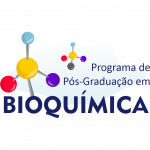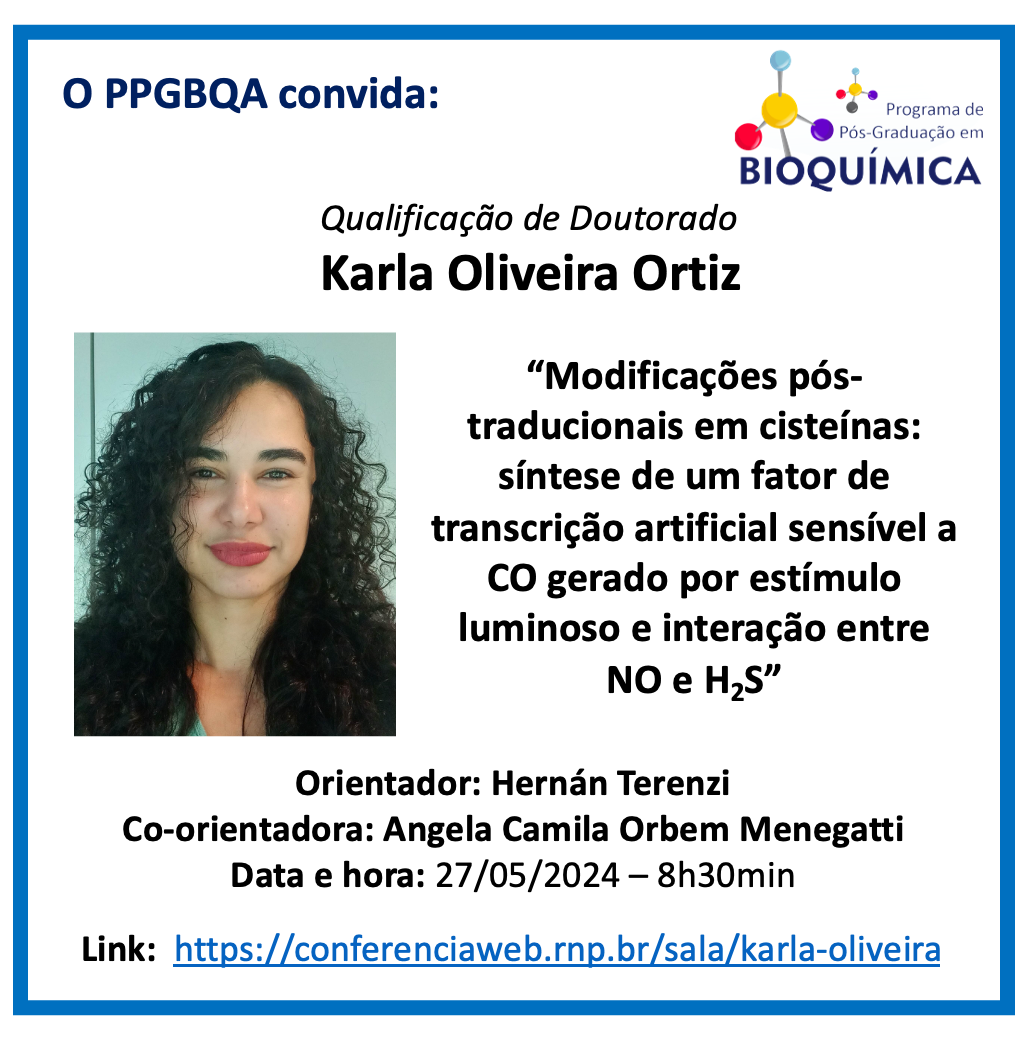PhD qualification
Qualificação de Mestrado
Pesquisadora do PPGBQA-UFSC publica estudo sobre rejuvenescimento na revista Nature Aging
A Professora e pesquisadora Dra Ariane Zamoner (ORCID: 0000-0003-2844-8563), do PPGBQA-UFSC em parceria com os pesquisadores Prof Dr Pedro Fontes Oliveira (ORCID: 0000-0002-4989-5699) e Dr Marco G. Alves (ORCID: 0000-0001-7635-783X), da Universidade de Aveiro, Portugal, publicaram um estudo na conceituada revista “Nature Aging” sobre o potencial terapêutico para o tratamento de problemas de saúde masculina relacionados à idade.
No artigo científico, em que a docente do PPGBQA-UFSC é primeira autora, os pesquisadores discutem uma nova possibilidade de mitigar as consequências do envelhecimento testicular, com efeito anti-envelhecimento sistêmico. Especificamente, os pesquisadores discutem de que modo a administração de ML-SA1 foi capaz de promover o “rejuvenescimento” das células somáticas testiculares que sustentam a produção de espermatozoides, as células de Sertoli (SCs), restabelecendo a produção de testosterona pelas células de Leydig. Esse tratamento não aliviou apenas os sintomas de hipogonadismo associados à idade, mas permitiu também a reversão da atrofia testicular. O restabelecimento da produção de testosterona associado a esse tratamento pode ainda mitigar os sinais de envelhecimento sistêmico aumentando também a estamina, o que sugere uma possível forma de retardar o envelhecimento em homens. Dessa forma, a pesquisa apresentou uma alternativa terapêutica promissora para o rejuvenescimento testicular, capaz de mitigar os efeitos sistêmicos da idade nos homens, abrindo novos caminhos para a melhoria da saúde e qualidade de vida masculina.
Veja o artigo completo no link
Na foto o Dr. Pedro Fontes Oliveira (esquerda), professor de Bioquímica do Departamento de Química da Universidade de Aveiro, a Dra. Ariane Zamoner Pacheco de Souza (centro), professora visitante na Universidade de Aveiro pelo Programa CAPES/PrInt, e Dr. Marco G. Alves (direita), investigador Principal no Departamento de Ciências Médicas (DCM), Instituto de Ciências Biomédicas (IBIMED) da Universidade de Aveiro.
Seminar PGBQA – Dr. Sílvia Conde
(Português do Brasil) Prêmio CAPES de Tese – Edição 2024
Master Selection 2024-1
The Coordination of the Post-Graduation Program in Biochemistry (PPGBQA) of the Federal University of Santa Catarina informs you that it will be open for the period from 11/17/2023 to 01/16/2024, as registrations for the Seleção e Admissão Processo no Program, at MESTRADO level. Registrations start on February 2024.
For more information, access the “Seleção de Mestrado” page.
Resultado prova Mestrado Edital 02-2023
Resultado: Edital 2-2023 Resultado
Doctorate Selection 2024/1
The Coordination of the Graduation Program in Biochemistry (PPGBQA) of the Federal University of Santa Catarina informs you that it will be open during the period from 11/27/2023 to 02/19/2024, as registrations for the Seleção e Admissão Processo ao PPGBQA at DOCTORATE level.
For more information, access “Seleção de Doutorado“.
(Português do Brasil) IMPORTANTE: Solicitações à SIPG
(Português do Brasil) Seleção para o Programa de Doutorado Sanduíche no Exterior
(Português do Brasil) Seleção de Mestrado
(Português do Brasil) Calendário de matrículas 2025/2
(Português do Brasil) Seleção de Doutorado
(Português do Brasil) Seleção de Pós-Doutorado – Bolsa FAPESC
___________________________________________________________________________________________________________________________
Oleic acid present in olive oil can combat cell death due to excess iron
In 1992, a young child died when his two-year-old brother gave him more than 30 bright, colorful pills. Inside the pills was the metal iron, deadly when ingested in excess. The use of tablets at adequate levels by the children’s mothers characterized dietary supplementation, as iron is essential for human beings, and its deficiency also causes harmful effects on health.
The research group, coordinated by Professor Marcelo Farina from the Biochemistry department at UFSC, has studied how excess iron causes damage to organisms and how some fat molecules (lipids) protect against injuries caused by iron. In a study conducted in collaboration with American and Spanish researchers, the research group coordinated by Professor Farina discovered that one of the main mechanisms by which excess iron causes damage is through the induction of ferroptosis, a type of cell death that is still poorly understood and characterized by intense oxidation of lipids in cell membranes. The work was funded by CAPES, CNPq, and FAPESC.
According to the professor, the harmful effects of excess iron do not only occur in severe cases of acute poisoning. “In fact, there is a human disease called hemochromatosis characterized by excess iron in the body due to genetic defects or the need for repeated blood transfusions, which have high levels of this metal”, he explains.
According to him, scientific evidence supports an association between iron levels and aging and points to iron accumulation in aging-related diseases. Patients with Parkinson’s disease have high iron levels in certain regions of the central nervous system. Among the treatments currently available for individuals with excess iron in the body, phlebotomy (bleeding) and chelating medications stand out, which form complexes with iron and facilitate its elimination.
The study, which was based on experimental models using the nematode Caenorhabditis elegans, mice and human cell lines, detected a lipid compound called oleic acid, a monounsaturated fatty acid present in abundance in olive oil, as a protective molecule capable of inhibiting ferroptosis. The consequence would be protection against damage induced by iron overload in the three experimental models.
“The study suggests that nutritional strategies based on the use of monounsaturated fatty acids, such as oleic acid, can mitigate the damage induced by excess iron, which could represent an additional therapeutic strategy”, explains the professor. “Interestingly, oleic acid is part of the Mediterranean diet, which is associated with health and longevity,” reinforces
Another mechanism uncovered in the study was the involvement of a key protein that determines whether oleic acid can be protective. In this case, the protein PPAR-alpha (peroxisome proliferator-activated receptor-alpha) was considered fundamental to the ability of oleic acid to protect against damage induced by excess iron in cells and nematodes.
The results of the study were disclosed in a scientific article published in the journal Cell Chemical Biology, which has as its first author researcher Josiane Mann, who was supervised by professor Marcelo Farina during her doctorate in the Postgraduate Program in Neurosciences and is currently a postgraduate fellow -Ph.D. from PPGBQA. The UFSC team included PPGBQA doctoral student Melania Santer and professor Alcir Dafré. The work is also signed by Professor Brent Stockwell (Columbia University, United States), who coordinated the pioneering work that culminated in the discovery of ferroptosis around a decade ago.
The results of the study were published in the journal Cell Chemical Biology, which has as its first author the researcher Josiane Mann, who was supervised by professor Marcelo Farina during her Ph.D. in the Postgraduate Program in Neurosciences and is currently a post-doctoral fellow at the PPGBQA. The UFSC team also included PPGBQA doctoral student Melania Santer and professor Alcir Dafré. The work is also signed by Professor Brent Stockwell (Columbia University, United States), who coordinated the pioneering work that culminated in the discovery of ferroptosis around a decade ago.
See the report at: https://noticias.ufsc.br/2023/11/oleo-presente-no-azeite-de-oliva-pode-combater-morte-de-celulas-por-excesso-de-ferro-diz-pesquisa-da-ufsc/ and the manuscript at: https://www.sciencedirect.com/science/article/pii/S2451945623003732?via%3Dihub


 »
» Português do Brasil
Português do Brasil Español
Español






